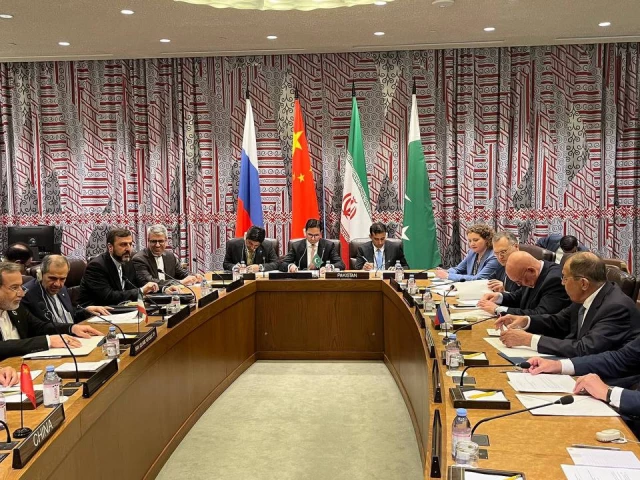Islamabad:
On Friday, Pakistan, China, Iran and Russia expressed a “great concern” in the face of the presence of terrorist groups operating in Afghanistan, warning that outfits such as Eiil, Al-Qaeda, the Army of the Liberation of Tehreek-E-Taliban (TTP), Balochistan Liberation Army (Bla) and others continue to threaten security regional and global.
The four countries have published a joint declaration after their fourth quadrilateral meeting on Afghanistan held on the sidelines of the 80th session of the United Nations General Assembly in New York. The rally, summoned to the invitation of Russia, brought together foreign ministers from the four states to examine the situation of deterioration in Afghanistan.
According to the press release, the ministers urged the Afghan authorities to take “effective, concrete and verifiable actions” against terrorist networks, in particular the dismantling of their training camps, the reduction in financing and the prevention of recruitment and access to arms. They also called for the non-discriminatory elimination of all militant outfits and stressed that Afghan soil should not be used against its neighbors or beyond.
Pakistan, in particular, has made the alarm several times on cross -border attacks by the TTP and other terrorist groups operating from Afghan soil. Islamabad urged Taliban authorities to take “verifiable measures” against such outfits, warning that not to do so underlying the regional stability.
Likewise, Iran accused groups based in Afghan like Jaish Ul-Adl of organizing attacks through its border, while China fears the presence of the Islamic Movement of East Turkestan (ETIM), which it considers a threat to its Western Xinjiang region. Russia also remains concerned about militant networks expanding their scope in Central Asia.
The four parties also underlined the support of Afghanistan as an independent state, united and peaceful, free from terrorism, war and narcotics. “They congratulated Kabul’s efforts to reduce the culture of opium, but have made the alarm on the growing production of synthetic drugs such as methamphetamine, calling for regional and international action coordinated drugs.
On the refugees, the ministers urged the Taliban authorities to create conditions for the safe and lasting return of millions of Afghans moved abroad. They praised Pakistan and Iran for welcoming large populations of refugees and pushed the international community to assume its responsibility through sustainable financial and technical support.
The declaration reiterated the calls for an inclusive political configuration in Afghanistan which represents all the ethnic and religious groups, while stressing the importance of the access of women and girls to education, employment, public life and basic services.
The four countries also said that NATO states should assume the “main responsibility” of Afghanistan’s current fate, urging them to return from frozen Afghan assets and to raise unilateral sanctions. They rejected the restoration of foreign military bases in Afghanistan or around Afghanistan, warning of such movements would undermine regional stability.
Foreign Ministers have also welcomed the current regional initiatives, in particular the format of Moscow and the commitment of the Shanghai cooperation organization on Afghanistan, and have committed to pursuing quadrilateral consultations.




